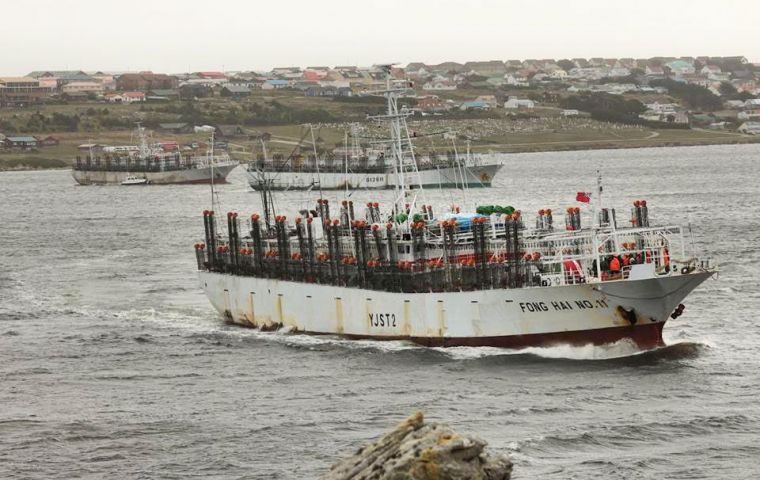MercoPress. South Atlantic News Agency
Falklands' GDP in 2018 reached £254.7 million with a real growth rate of 3,9%
 In 2018 fishing remained as the largest economic activity in the Falkland Islands, “accounting for 64% of nominal GDP in 2018”
In 2018 fishing remained as the largest economic activity in the Falkland Islands, “accounting for 64% of nominal GDP in 2018” The Gross Domestic Product (GDP) of the Falkland Islands increased by 15.7% between 2017 and 2018 (in nominal terms), primarily driven by high results within the fishing sector that year, according to the recently released Falkland Islands National Accounts.
The GDP of the Islands in 2018 was £254.7 million, after the nominal 15.7% increase, while in real terms – adjusting for the effects of price changes and exchange rate fluctuations – the increase in GDP was 3.9%.
This GDP puts the Falklands between the Pacific Island Republic of Palau (£183.4m) and the Federated States of Micronesia (£288.6m), as per the International Monetary Fund (IMF) 2020 estimates – ranked 190th globally.
However, in terms of Gross National Income (GNI) per capita, which is calculated by adjusting for net foreign income and better reflects income accruing to Falkland Islands resident individuals and companies, the per capita figure is £ 54.8k.
This figure theoretically puts the Islands as the sixth highest in countries and dependencies for GNI per capita by World Bank’s current figures, below Luxembourg (£56.8k) and above Switzerland (£53.1k).
The table, provided in the Falkland Islands Government report, shows the breakdown of nominal GDP by industry in 2018 – categorized based on the United Nations International Standard Industrial Classification of All Economic Activities (ISIC).
In 2018 fishing remained as the largest economic activity in the Falkland Islands, “accounting for 64% of nominal GDP in 2018.” Over the period of 2009-2018, which the most recent national accounts report covers, the fishing industry share of nominal GDP varied between a low of 45% and the high of 64% in 2018.
The next major contributors were ‘public administration and defense, education, human health and social work activities’, and ‘wholesale and retail trade, transportation and storage, accommodation and food service activities’.
The report also illustrated the GDP and growth rate of the Falkland Islands economy excluding the “resource sectors” of oil and gas exploration and development, and fishing and aquaculture. The report explains that the resource sectors have, “exhibited a great degree of volatility over the past, therefore excluding them and estimating the net contribution to GDP of the other sectors of the economy, is a useful exercise to monitor the health and sustainability of national economic growth.”
The report continues that, “between 2009 and 2018, non resource GDP has been growing at a compounded average growth rate of +5.4% per year in nominal terms and +3.0% in real terms.” Notable increases included a £164.5m contribution from the fishing and aquaculture sector in 2016, a three year increase in value added from mining and quarrying from 2010 until 2012, gradually decreasing thereafter.
Consistency was seen in areas such as crop and animal production, and information and communication, while gradual increase was present in real estate activities, manufacturing and public administration and defense, compulsory social security. (PN)




Top Comments
Disclaimer & comment rulesCommenting for this story is now closed.
If you have a Facebook account, become a fan and comment on our Facebook Page!